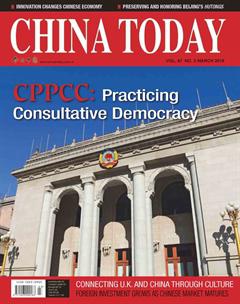Socialist Consultative Democracy
Every March the international community will watch with a keen eye the “two sessions” held in Beijing. The “two sessions” refer to the annual sessions of the National Peoples Congress (NPC) and Chinese Peoples Political Consultative Conference (CPPCC).
During “two sessions” NPC delegates and CPPCC members will show their concerns for peoples wellbeing, express public opinions, and guarantee civil rights. Electoral democracy and consultative democracy highlight the “two sessions.” Li Junru, a member of the Standing Committee of the 11th National Committee of the CPPCC, remarked that China is by no means a nation without democracy. Nevertheless, he noted, Chinese people possess their own understanding and demands for democracy that are quite different from those in Western countries. Hence, a democratic pattern conforming to the fundamental realities of the country and the requests of the people is required.
Consultative democracy guarantees widespread and effective participation in politics through consultations carried out by political parties, peoples congresses, government departments, CPPCC committees, peoples organizations, communities, and social organizations.
The CPPCC has continued to play a significant role in promoting consultative democracy. In his report delivered at the 19th National Congress of the Communist Party of China (CPC), President Xi Jinping pointed out: “The CPPCC, as a distinctively Chinese political institution, is a major channel for socialist consultative democracy, and its committees are specialist consultative bodies.”
Since the 18th CPC National Congress held in 2012, the CPPCC has been striving to advance extensive, multilevel, and institutionalized development of consultative democracy. Ideas and thoughts developed at the plenary meetings have been serving as guiding principles. Discussion meetings of the Standing Committee and consultations on specific topics are major forms. Biweekly symposiums, consultative meetings involving relevant departments, and consultations to discuss CPPCC members proposals have been taking place on a regular basis.
With the epitome of consultative democracy, the Special Report of this issue sheds light on the success of the practice of this democratic pattern in China.
In 2014, Xi Jinping required the CPPCC to conduct, in a flexible and regular manner, intensive consultations on special issues with people who work on these issues, with representatives from all sectors of society, and with relevant government authorities on the handling of proposals.
The essence of socialist democracy is to have people discuss their own affairs to find the greatest common denominator of the desires and demands of the whole society. The platform of CPPCC is of great necessity, and a free and harmonious environment is also important.
Negotiation, interaction and communication are the defining features of consultations. This is an important reason why they can gain substantial results.

